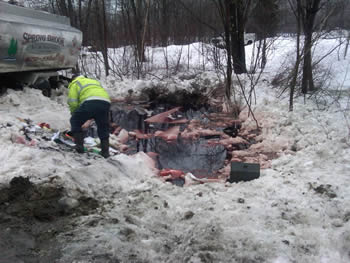Home → Spills & Site Cleanup → Programs → Emergency Spill Response → FAQs
Frequently Asked Questions

If you have an oil or hazardous material spill, witness an oil or hazardous material spill, or if there is a threat of a spill of oil or hazardous materials (i.e., truck accident, vessel grounding, train derailment, etc.), your first step should be to report the spill. Response Services staff will be able to provide you with guidance about what to do next and if necessary, will respond to the spill site to initiate/advise the clean-up and proper disposal of the spill. Procedures and requirements for reporting spills vary depending on the material spilled. To report an oil spill 24 hours a day call, 800-482-0777. Hazardous materials spills/incidents must be reported to the Department of Public Safety (State Police). To report a hazardous materials spill/incident 24 hours a day call, 800-452-4664. For additional contacts and emergency numbers see the Contacts and Emergency Telephone Numbers or contact the DEP office in your region.
When reporting a spill or the threat of a spill, it is helpful if you are able to provide the following information:
- What was spilled?
- How much was spilled and is there a chance that more can be spilled? Is it contained?
- When did the spill occur?
- What is the location of the spill?
- Is help needed and how urgent is the situation? Is help on the way?
- What are the natural resources that might be impacted (i.e. ocean, lake, river, wells, etc.)??
- Who is the owner company? Have they been contacted?
If you are able to, without endangering the health and safety of yourself or others, plug holes when possible, shut off valves, contain any runoff water.
Reporting procedures and requirements vary depending on the material spilled.
For oil spills:
- If oil (including but not limited to gasoline, diesel, heating oils, hydraulic oils and lubricating oils) is spilled, an initial telephone report of any discharge should be made to the DEP as soon as possible, but within two hours. If the report is made within 2 hours, the responsible party is exempt from any fines for the discharge.
- Evidence of a leak from an underground storage tank must be reported within 24 hours. However, certain exemptions may apply. Call the DEP office in your area for more information about exemptions.
For hazardous materials:
- All hazardous materials spills/incidents must be reported immediately to the Department of Public Safety (State Police).
- Additionally, hazardous waste spills must be reported in writing to the DEP within 15 days. Hazardous material spills must be reported in writing to the DEP within 30 days. Hazardous Waste and Hazardous Material Spill or Discharge Report Form.
Your call to report a spill will alert a DEP responder in Augusta, Bangor, Portland, or Presque Isle. DEP Response staff is on-call 24 hours a day. Response Services staff will be able to provide you with guidance about what to do next and if necessary, will respond to the spill site to initiate and advise on the clean-up and proper disposal of the spill.
Cleanup methods depend on the situation, product, and resource affected. Methods used may include: sorbents, pumps, vacuums, controlled burns, excavating contaminated soils, ground water treatment and neutralization.
The spiller (responsible party) is legally responsible for cleanup and may choose to perform the cleanup under the direction of the DEP. When a responsible party does not or cannot clean up a spill other agencies such as the local fire department or the DEP, must act to protect public health, safety and the environment.
Workers must be adequately trained before they can be involved in spill response. Both the state and federal governments have standards for health and safety for individuals involved in spill response. Anyone who responds to spills must receive training in compliance with these state and federal standards.
Staff from DEP will provide the responsible party with advice on proper spill cleanup. Depending on the nature and extent of the spill, oversight of cleanup may also be provided by the local fire department, the U.S. Environmental Protection Agency, or the U.S. Coast Guard.